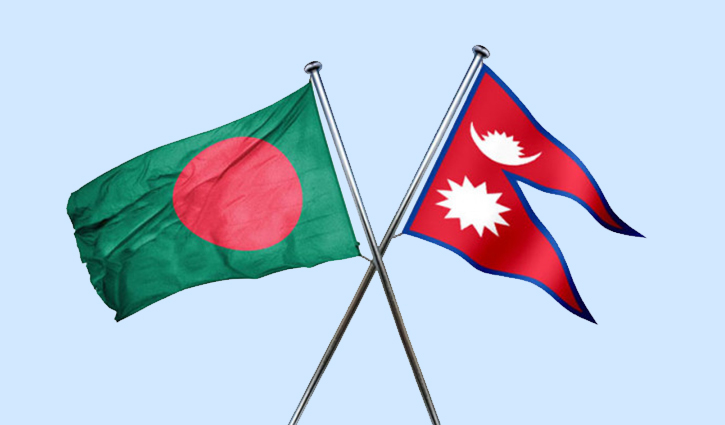Bangladesh’s transit to Nepal hangs in the balance
Asif Showkat Kallol || BusinessInsider

Flags of Bangladesh and Nepal. Photo: Representational
The government is yet to decide if it will pursue India bilaterally or approach multilaterally for seeking a regular transit route from it for road and railway trade with Nepal, an official of the commerce ministry said.
Dhaka is yet to receive any regular transit facilities from India for exports-imports of goods to and from Nepal and Bhutan, respectively, despite a decade and a half having elapsed since the two next-door neighbours began discussions on the matter in 2005.
The official of the commerce ministry, requesting anonymity, said Bangladeshi businessmen have not been entitled to such transit facilities for a long time due to the antagonistic attitude of the successive Indian governments.
Amid such a strain, officials of Bangladesh’s foreign and commerce ministries sat last week to discuss any way-out to this end.
Nepal transit agreement has been hanging in the balance since its signing in 1976, he said.
In February, India approved a lone permit for a fertiliser consignment to Nepal using Indian territory, but no further transit or transhipment facilities have been granted. Contrarily, Indian traders have been receiving various transhipment facilities—using Bangladesh’s rivers, railways, and highways to get their products into India’s North East provinces.
Some senior officials of the foreign and commerce ministries held a meeting on Tuesday at the commerce ministry where they discussed having multilateral agreements between Bangladesh, Bhutan, India and Nepal (BBIN) to expedite everyone’s foreign trade. And, India, accordingly will have to provide Nepal and Bhutan transit facilities to Bangladesh and vice versa, officials said.
If the Bangladesh government endorses any bilateral deal with Nepal, India may not approve to let her territories be used by Dhaka and Kathmandu.
Also, some new transit fees have to be set by the respective authorities of these Himalayan nations which was signed some 45 years ago, the officials said.
In this regard it was also discussed that India should allow the development of bordering six-kilometre roads between India and Nepal.
It also discussed developing rail stations in Rohonopur and Singarbad in India and set up a railway communication within six months to tap full benefits of India-Nepal transit, the officials said.
Bangladeshi trader Nazrul Islam who exports goods to Nepal, said a number of Bangladeshi products such as pharmaceuticals, motorbikes, and various electronics have good markets in Nepal.
“The branded products of Beximco pharma, Incepta pharma, Pran, Walton and Rana are popular in Kathmandu and other major cities,” he told the Business Insider Bangladesh on Saturday.
Nazrul said these cross-national trade between Bangladesh and Nepal takes place taking permission from India which is in the middle of both the countries under South Asian Free Trade Area (SAFTA). “But, it is difficult to introduce a new product in Nepal due to non-traffic barriers and complications in obtaining transit permissions from India.”
He also cited the 350 kilometre poor road condition from Bangladesh border to Nepal’s capital city as an obstacle to facilitate trade between Dhaka and Kathmandu.
It is good news for local pharmaceutical companies that most of the Nepalese physicians prescribe Bangladeshi drugs because those doctors have obtained their medical science graduation from various Bangladeshi medical colleges, he said.
“If Nepal can use Bangladesh’s Saidpur airport, trade between Nepal and Bangladesh would multiply,” Nazrul said.
He said also Bangladeshi potatoes could be sold in Nepal as one kilogram of the starch sells there at 90 Nepali rupees.
On condition of anonymity, a commerce ministry official told the Business Insider Bangladesh that the delay in transhipment authorisation from India was caused by Indian self-interest.
“Currently, India can charge customs fees and tariffs when Bangladesh wants to ship goods to Nepal or Bhutan through their territory. India will lose revenue if it offers transhipment facilities, as transit fees would be trimmed,” the official said.
“Nepal and Bhutan are landlocked countries in South Asia. They are dependent on India for purchasing goods. If India allows transit and transhipment facilities to other South Asian countries, Nepal and Bhutan will become less dependent on India, and this will lead India to lose its trade dominance in those two countries,” he added.
The Export Promotion Bureau data of 2018-19 fiscal year show goods worth $38.1 million were exported to and worth $9.9 million imported from Nepal.
Currently, Bangladesh exports goods to Nepal and Bhutan under separate preferential trade agreements (PTAs), using the South Asian Free Trade Area or special permission from India. Transit fees under such arrangements are higher than they would have been if a transhipment agreement with India is in place.
The South Asian Free Trade Area (SAFTA) is an agreement reached on January 6, 2004, at the 12th SAARC summit in Islamabad, Pakistan. It created a free-trade area of 1.6 billion people in Afghanistan, Bangladesh, Bhutan, India, the Maldives, Nepal, Pakistan and Sri Lanka to reduce customs duties of all-traded goods to zero by the year 2016. The SAFTA agreement came into force on January 1, 2006.
























